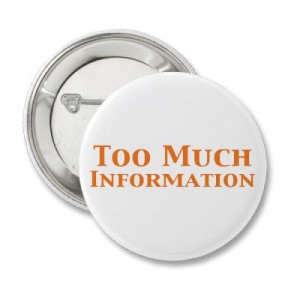When is sharing at work just TMI?
We’ve all been there at that awkward moment. We’re standing waiting for the conference room door to be unlocked for the meeting, and Lisa asks Joan if she missed work yesterday because she was ill. Joan answers with, “Oh yeah! I had this awful stomach bug that…” and she proceeds to give everyone the gruesome details of exactly how the bug affected her. Awkward!! Way TMI.
Joan made the crucial mistake of over-sharing personal details. It’s easy to do, especially when we strive to maintain close professional relationships with our business contacts. Our friendliness and positive attitudes are what make us such outstanding customer service gurus, in-house as well as outside the company.
We must, however, remember that every detail is not necessary to get our point across. In Joan’s case, it would have been more appropriate to say, ‘Yes, I had some kind of 24-hour bug, but I’m much better now, thanks. I’m looking forward to this meeting.’ Not only did she keep the details to herself, but she turned the discussion back to work-related matters.
Just about everyone knows that TMI stands for ‘too much information.’ It’s become a computer meme, even a worldwide joke, but it’s not really a joke. Many people often chatter on, without thinking about how what they are saying is affecting their listeners.
Whenever a business conversation becomes personal, remember this alternative
TMI:
Turn the conversation back to business. A personal anecdote can make a point or support an idea during a conversation, but the focus of the conversation is business.
Marshall your thoughts before you speak. Think ahead to any details that might just be too much for the situation, and remove them from your statements.
Indicate your reluctance to go into too much detail by changing the subject.
By considering TMI whenever you get the urge to over-share, you’ll be able to avoid being considered a chatterbox, and your listeners will be thrilled that you didn’t gross them out or embarrass them.

